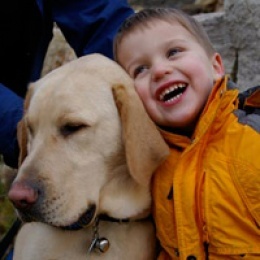HARTFORD, Conn. — When Porter the dog tries to figure out why his owner has placed a toy bone under a bucket, his response might provide some insight about human development, autism and other learning disabilities.
That’s the hope of Laurie Santos, who runs the Canine Cognition Center at Yale, which opened in December. She pointed to the 4-year-old chocolate Lab mix, brought in by psychology grad student Kristi Leimgruber. Porter is growing up in the same kind of environment as human children, Santos said, so comparing how he learns with the way people learn can tell us a lot about human development.
“So much more than primates, dogs are more cued into what we care about and what we know,” Santos said. “And they might have been shaped in a way that’s very different from any other animal species in part because, in a sense, they (behave) more like a human child who’s cued in (to humans) than, say, a chimpanzee.”
For all that we ask of dogs — loyalty, companionship, slipper-fetching — rarely have we asked what drives dogs. That’s starting to change in the world of academia, where the dog’s status as a research subject has increased in recent years.
The Canine Cognition Center — where Santos and her researchers study dogs’ decision-making processes and how they pick up on social cues — is the latest example of a growing interest in how dogs can offer insights into behavioral and cognitive science. Santos is a professor of psychology, internationally known for her research of monkey behaviors.
Although she still studies monkeys, Santos said dogs may offer something to her research that monkeys can’t.
Read more about this new development from Disability Scoop
